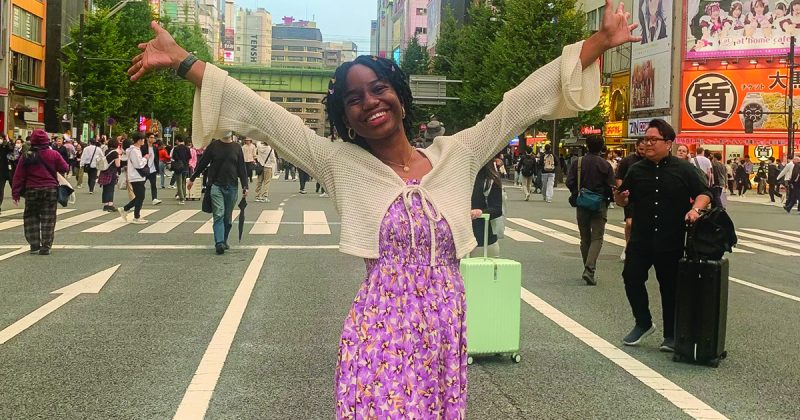
(AdobeStock photo)
In addition to our Chapter & Verse feature, enjoy more books in the spring 2024 issue. Read the monthly “Bookmark This” feature by searching those terms on the College website.
 Master Plans and Minor Acts: Repairing the City in Post-Genocide Rwanda (The University of Chicago Press) by Shakirah E. Hudani, assistant professor in the department of African, African American and diaspora studies and adjunct assistant professor in the department of city and regional planning. Through extended ethnographic and qualitative research in Rwanda in the decades after the genocide of 1994, Hudani’s book questions how repair after conflict is realized amidst large-scale urban transformation. She ties Rwanda’s transformation to contexts of urban change in other post-conflict spaces, bringing to the fore critical questions about the ethics of planning in such complex geographies. Read a Bookmark This feature on the book.
Master Plans and Minor Acts: Repairing the City in Post-Genocide Rwanda (The University of Chicago Press) by Shakirah E. Hudani, assistant professor in the department of African, African American and diaspora studies and adjunct assistant professor in the department of city and regional planning. Through extended ethnographic and qualitative research in Rwanda in the decades after the genocide of 1994, Hudani’s book questions how repair after conflict is realized amidst large-scale urban transformation. She ties Rwanda’s transformation to contexts of urban change in other post-conflict spaces, bringing to the fore critical questions about the ethics of planning in such complex geographies. Read a Bookmark This feature on the book.
Jerusalem Through the Ages: From its Beginnings to the Crusades (Oxford University Press) by Jodi Magness, Kenan Distinguished Professor for Teaching Excellence in Early Judaism. Jerusalem was first settled 5,000 years ago by a mountain spring between the Mediterranean and Dead Sea. In this new book, Magness offers a broad yet detailed account of one of the world’s oldest and holiest cities. She introduces readers to the city’s complex and layered history, providing a broad yet detailed account, including the most recent archaeological discoveries.
Equal Care: Health Equity, Social Democracy and the Egalitarian State (Johns Hopkins University Press) by Seth A. Berkowitz (psychology and public policy ’04, M.D. ’08), associate professor in the UNC School of Medicine. Current efforts to address health inequity focus on mitigating the harms of injustice rather than confronting injustice itself. In Equal Care, Berkowitz offers an innovative vision for the future of health equity by examining the social mechanisms that link injustice to poor health. He also presents practical policies designed to create a system of social relations that ensures equal care for everyone.
Jane Austen and the Price of Happiness (Johns Hopkins University Press) by Inger S.B. Brodey, associate professor of English and comparative literature. How did Jane Austen become a cultural icon for fairy-tale endings when her own books end in ways that are rushed, ironic and reluctant to satisfy readers’ thirst for romance? In her latest book, Brodey journeys through the iconic novelist’s books in the first full-length study of Austen’s endings. Through a careful exploration of Austen’s own writings and those of the authors she read during her lifetime, Brodey examines the contradictions that surround this queen of romance.
 Organizing Eating: Communicating Equity Across U.S. Food Systems (Routledge Taylor & Francis Group) edited by Sarah E. Dempsey, associate professor of communication. This collection is a collaborative project that brings together 17 contributors who are responding to the need to transform our current food systems around principles of equity and justice. The book helps readers understand how communication and power combine to actively shape how we eat and work within the U.S. food system. It offers grounded insight into the everyday dynamics of organizing for change within the food system, from community responses to water injustice in Detroit, Michigan, to the ways that food chain workers are collectively organizing to challenge corporate power, to the tensions around gender, race, class and gentrification within food governance initiatives in Denver, Colorado. Read a Bookmark This feature on the book.
Organizing Eating: Communicating Equity Across U.S. Food Systems (Routledge Taylor & Francis Group) edited by Sarah E. Dempsey, associate professor of communication. This collection is a collaborative project that brings together 17 contributors who are responding to the need to transform our current food systems around principles of equity and justice. The book helps readers understand how communication and power combine to actively shape how we eat and work within the U.S. food system. It offers grounded insight into the everyday dynamics of organizing for change within the food system, from community responses to water injustice in Detroit, Michigan, to the ways that food chain workers are collectively organizing to challenge corporate power, to the tensions around gender, race, class and gentrification within food governance initiatives in Denver, Colorado. Read a Bookmark This feature on the book.
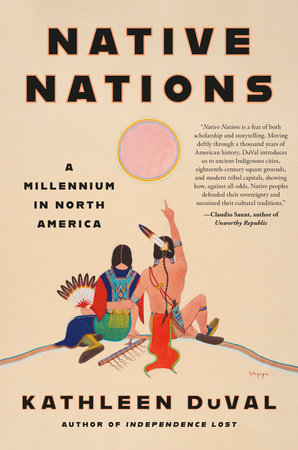 Native Nations: A Millennium in North America (Penguin Random House) by Kathleen DuVal, professor of history. Beginning with the millennium-long histories of 16th-century Native American societies, DuVal contextualizes early encounters between Europeans and Native nations, foregrounding the political power Indigenous people continue to exert over their lands and institutions. Publishers Weekly gave the book a starred review, writing “DuVal provides a profoundly empowered history of Native America.” An excerpt of the book was recently published in The Atlantic.
Native Nations: A Millennium in North America (Penguin Random House) by Kathleen DuVal, professor of history. Beginning with the millennium-long histories of 16th-century Native American societies, DuVal contextualizes early encounters between Europeans and Native nations, foregrounding the political power Indigenous people continue to exert over their lands and institutions. Publishers Weekly gave the book a starred review, writing “DuVal provides a profoundly empowered history of Native America.” An excerpt of the book was recently published in The Atlantic.
Carey: Genesis of the Song, a memoir by Cary Wingfield Raditz (English ’68). In early 1970, Cary Raditz met Joni Mitchell when she arrived in the seaside village of Matala, Crete, where he was living. For his 24th birthday present, she wrote him the song “Carey.” Raditz’s memoir, writes Kate Mossman of The New Statesman magazine, “is not just an intimate and surprising portrait of Joni Mitchell at the very point she became famous; it is a front-line account of a time, place and attitude that have passed into legend. This is the story of a man who found himself trapped in a song and the extraordinary events that led up to it.” Kirkus Reviews adds that Carey is “A wild, explosive memoir about a unique European locale with a fascinating connection to a legendary musician.”
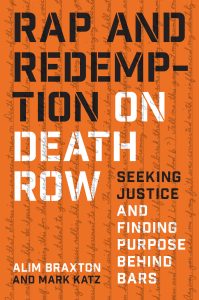 Rap and Redemption on Death Row: Seeking Justice and Finding Purpose Behind Bars (UNC Press) by Alim Braxton and Mark Katz. Katz is the John P. Barker Distinguished Professor of Music. Imprisoned since age 19, Braxton has spent more than a quarter century on North Carolina’s death row. During that time, he has converted to Islam and dedicated his life to redemption. A rapper since age 13, Braxton uses his rhymes as a form of therapy and to advocate for prison reform. The book focuses on the correspondence — now more than 175 letters and hundreds of pages — between Braxton and Katz, who has been studying and writing about hip-hip for 25 years. Read a story about the book.
Rap and Redemption on Death Row: Seeking Justice and Finding Purpose Behind Bars (UNC Press) by Alim Braxton and Mark Katz. Katz is the John P. Barker Distinguished Professor of Music. Imprisoned since age 19, Braxton has spent more than a quarter century on North Carolina’s death row. During that time, he has converted to Islam and dedicated his life to redemption. A rapper since age 13, Braxton uses his rhymes as a form of therapy and to advocate for prison reform. The book focuses on the correspondence — now more than 175 letters and hundreds of pages — between Braxton and Katz, who has been studying and writing about hip-hip for 25 years. Read a story about the book.
Questioning Borders: Ecoliteratures of China and Taiwan (Columbia University Press) by Robin Visser, professor of Asian and Middle Eastern studies. Questioning Borders explores recent eco-literature by Han and non-Han Indigenous writers of China and Taiwan, analyzing relations among humans, animals, ecosystems and the cosmos in search of alternative possibilities for creativity and consciousness. Informed by extensive field research, Visser compares literary works by writers set in Xinjiang, Tibet, Inner Mongolia, Southwest China and Taiwan— sites of extensive development, migration and climate change impacts.
Respect and Loathing in American Democracy: Polarization, Moralization and the Undermining of Equality (University of Chicago Press) by Jeff Spinner-Halev and Elizabeth Theiss-Morse. Spinner-Halev is the Kenan Eminent Professor of Political Ethics. Many Americans believe respecting others is a necessary virtue, yet many struggle to respect opposing partisans. Through a multidisciplinary analysis, Spinner-Halev and Theiss-Morse explore why this is and why respect is vital to — and yet so lacking in — contemporary U.S. politics. They argue that liberals and conservatives alienate one another because they moralize different issues. Yet Spinner-Halev and Theiss-Morse also propose that liberals and conservatives are less divided than many think and offer a path forward that, while challenging, is far from impossible for citizens to traverse. Read a Bookmark This feature on the book.
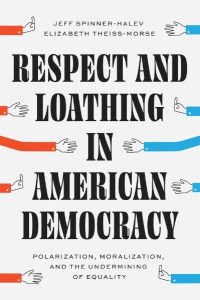 Cracks in the Outfield Wall: The History of Baseball Integration in the Carolinas (UNC Press) by Chris Holaday (political science and geological sciences ’14). The best-known story of integration in baseball is Jackie Robinson, who broke the major league color line in 1947. Robsinon’s story, however, differs from those of the many players who integrated the game at all professional levels in the Jim Crow South. Cracks in the Outfield Wall offers the first book-length history of baseball’s integration in the Carolinas, including experiences of players in a range of distinct communities and the changing structure of the professional baseball system. By showing how race and the national pastime intersected at the local level, Holaday offers readers new context to understand the long struggle of equality in the game.
Cracks in the Outfield Wall: The History of Baseball Integration in the Carolinas (UNC Press) by Chris Holaday (political science and geological sciences ’14). The best-known story of integration in baseball is Jackie Robinson, who broke the major league color line in 1947. Robsinon’s story, however, differs from those of the many players who integrated the game at all professional levels in the Jim Crow South. Cracks in the Outfield Wall offers the first book-length history of baseball’s integration in the Carolinas, including experiences of players in a range of distinct communities and the changing structure of the professional baseball system. By showing how race and the national pastime intersected at the local level, Holaday offers readers new context to understand the long struggle of equality in the game.
Come! Come! Where? Where? (UNC Press) by James Seay, professor emeritus of English and comparative literature. In this collection of essays, Seay dives into some of life’s big experiences: what it means to be a parent, lose a child, observe and live through the collision of cultures, confront mental illness and find the universal in the particularity of every day. Seay dips in and out of his life and the larger well of collective human experience as he transports readers from the American South to the former Soviet Union and beyond. Seay offers few easy answers for the big questions he explores. But walking with him on his journeys will open eyes to the possibilities, tenderness and mysteries that surround us, hidden among everyday things.
 The Ethics of Cities: Shaping Policy for a Sustainable and Just Future (UNC Press) by Timothy Beatley (M.A. political science ’85, Ph.D. city and regional planning ’86). While ethical and value conflicts affect cities globally, leaders and citizens alike often view urban governance as primarily an administrative — or worse, a merely political — task. Beatley challenges readers to consider the issues in our cities as moral problems and consider the question “How can a city become more ethical?” Cities must take profound steps to address social injustice and plan for climate change — both moral obligations — and this approachable and readable introduction to moral philosophy, urban planning and social justice will help new generations to grapple with these global issues.
The Ethics of Cities: Shaping Policy for a Sustainable and Just Future (UNC Press) by Timothy Beatley (M.A. political science ’85, Ph.D. city and regional planning ’86). While ethical and value conflicts affect cities globally, leaders and citizens alike often view urban governance as primarily an administrative — or worse, a merely political — task. Beatley challenges readers to consider the issues in our cities as moral problems and consider the question “How can a city become more ethical?” Cities must take profound steps to address social injustice and plan for climate change — both moral obligations — and this approachable and readable introduction to moral philosophy, urban planning and social justice will help new generations to grapple with these global issues.
Sexual Violence and American Slavery: The Making of a Rape Culture in the Antebellum South (UNC Press) by Shannon C. Eaves (journalism & mass communication ’03, M.A. history ’10, Ph.D. history ’15). It is impossible to separate histories of sexual violence and the enslavement of Black women in the antebellum South. In Sexual Violence and American Slavery, Eaves places sexual violence at the center of the systems of power and culture and mines autobiographies, diaries, court records and other primary sources to show that sexual exploitation, including rape, entangled slaves and slave owners in battles over power to protect themselves and their communities, to avenge hurt and humiliation and to punish and eliminate future threats.
Published by the Author: Self-Publication in Nineteenth-Century African American Literature (UNC Press) by Bryan Sinche (M.A. English ’02, Ph.D. English ’06). Publication is an act of power. Because nineteenth-century Black Americans faced numerous challenges getting their writing into print or the literary market, many published their own books and pamphlets in order to garner social, political or economic rewards. The history of African American self-publication has largely been hidden until now. In Published by the Author, Sinche explores this history and reassesses how print culture both allowed Black ideas and stories to be disseminated to a wider reading public and enabled authors to retain financial and editorial control over their own narratives.
Intersecting Aesthetics: Literary Adaptations and Cinematic Representation of Blackness (University Press of Mississippi) edited by Charlene Regester, Cynthia Baron, Ellen C. Scott, Terri Simone Francis and Robin G. Vander. Regester is associate professor in the department of African, African American and diaspora studies. This new book illuminates how 20th century Black writers and filmmakers struggled to create authentic adaptations that reflected Black experiences. Their work ultimately explores the effects racial perspectives have on film adaptations and how race-inflected cultural norms have influenced studio and independent film depictions. Publishers Weekly called it “a riveting take on overlooked chapters in Hollywood history.”
 No Sacrifice Too Great: The 1st Infantry Division in World War II (University of Missouri Press) by Gregory Fontenot (M.A. history ’80). The U.S. 1st Infantry Division, known as the Big Red One, adapted to dynamic battlefield conditions throughout the course of its deployment during World War II by innovating behavior, including tactics, techniques and procedures. In No Sacrifice Too Great, which includes an extensive photographic essay featuring many previously unpublished images, Fontenot includes the stories of individual members of the Big Red One, from high-ranking officers to enlisted men fresh off the streets of Brooklyn, and combines analysis with narrative for an absorbing and thorough read.
No Sacrifice Too Great: The 1st Infantry Division in World War II (University of Missouri Press) by Gregory Fontenot (M.A. history ’80). The U.S. 1st Infantry Division, known as the Big Red One, adapted to dynamic battlefield conditions throughout the course of its deployment during World War II by innovating behavior, including tactics, techniques and procedures. In No Sacrifice Too Great, which includes an extensive photographic essay featuring many previously unpublished images, Fontenot includes the stories of individual members of the Big Red One, from high-ranking officers to enlisted men fresh off the streets of Brooklyn, and combines analysis with narrative for an absorbing and thorough read.
 Live Dead: The Grateful Dead, Live Recordings and the Ideology of Liveness (Duke University Press) by John Brackett (music ’99, Ph.D. music ’03). Performing more than 2,300 shows between 1965 and 1995, the Grateful Dead’s reputation as a “live band” was, and continues to be, sustained by thousands of live concert recordings — from the group’s official releases to fan-produced tapes. In Live Dead, musicologist Brackett draws on materials and documents contained in the Grateful Dead Archive to explore how live recordings became meaningful among the band and their fans, not only as sonic souvenirs of past musical performances but also as expressions of assorted ideals, including notions of “liveness,” authenticity and the power of recorded sound.
Live Dead: The Grateful Dead, Live Recordings and the Ideology of Liveness (Duke University Press) by John Brackett (music ’99, Ph.D. music ’03). Performing more than 2,300 shows between 1965 and 1995, the Grateful Dead’s reputation as a “live band” was, and continues to be, sustained by thousands of live concert recordings — from the group’s official releases to fan-produced tapes. In Live Dead, musicologist Brackett draws on materials and documents contained in the Grateful Dead Archive to explore how live recordings became meaningful among the band and their fans, not only as sonic souvenirs of past musical performances but also as expressions of assorted ideals, including notions of “liveness,” authenticity and the power of recorded sound.
The City After Property: Abandonment and Repair in Postindustrial Detroit (Duke University Press) by Sara Safransky (M.A. city and regional planning ’08, Ph.D. geography ’15). In The City after Property, Safransky examines how postindustrial decline generates new forms of urban land politics. She connects contemporary debates over neoliberal urbanism to Cold War histories and foregrounds how the making of modern property regimes have shaped urban policy and politics. Additionally, she draws on critical geographical theory and community-based ethnography to show how private property functions as a racialized construct, an ideology and a moral force that shapes selves and worlds. By thinking about the city “after property,” Safransky illuminates alternative ways of imagining and organizing urban life.
The Age of Grievance (Simon & Schuster) by Frank Bruni (English ’86). The twists and turns of American politics are unpredictable, but the tone is a troubling given. It’s one of grievance. More and more Americans are convinced that they’re losing because somebody else is winning. More and more tally their slights, measure their misfortune and assign particular people responsibility for it. From bestselling author and longtime New York Times columnist Bruni comes a lucrid, powerful examination of the ways in which grievance has come to define our culture and politics, on both the right and the left.
Read the spring ’24 Chapter & Verse feature — a poem by Ross White, “Wonders never cease.”
Published in the Spring 2024 issue | Chapter & Verse
Read More

Parker receives Jefferson Award, one of UNC’s highest honors
Institute for the Arts and Humanities Director Patricia Parker accepted…
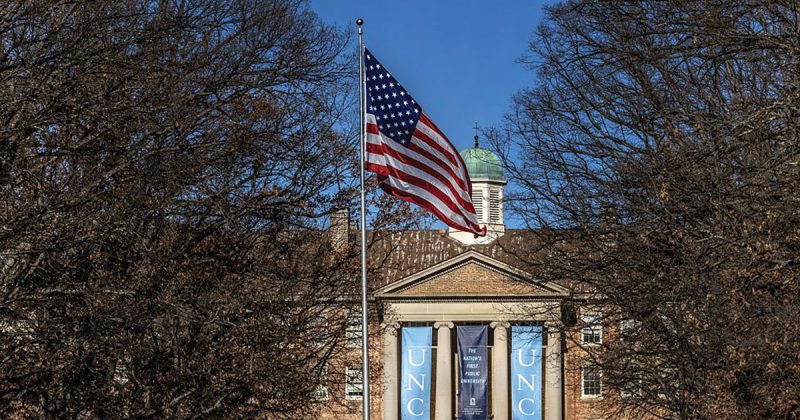
Carolina Asia Center trains Fort Liberty soldiers
UNC faculty provide soldiers meaningful expertise in Asian language, culture…


